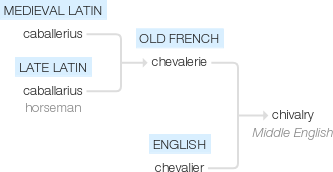Chivalry
Middle English: from Old French chevalerie, from medieval Latin caballerius, for late Latin caballarius ‘horseman’ (see chevalier).
wiktionary
From Middle English chivalrie, a late 13th century loan from Old French chevalerie(“knighthood, chivalry, nobility, cavalry”) (11th century), the -erie(“-ery”) abstract of chevaler(“knight, horseman”), from Medieval Latin caballarius(“horseman, knight”), from caballus(“horse”). Medieval Latin caballaria(“knighthood, status or fief of a knight”) dates to the 12th century. Doublet of cavalry.
etymonline
chivalry (n.)
c. 1300, "body or host of knights; knighthood in the feudal social system; bravery in war, warfare as an art," from Old French chevalerie "knighthood, chivalry, nobility, cavalry, art of war," from chevaler "knight," from Medieval Latin caballarius "horseman," from Latin caballus "nag, pack-horse" (see cavalier).
From late 14c. as "the nobility as one of the estates of the realm," also as the word for an ethical code emphasizing honor, valor, generosity and courtly manners. Modern use for "social and moral code of medieval feudalism" probably is an 18c. historical revival.
